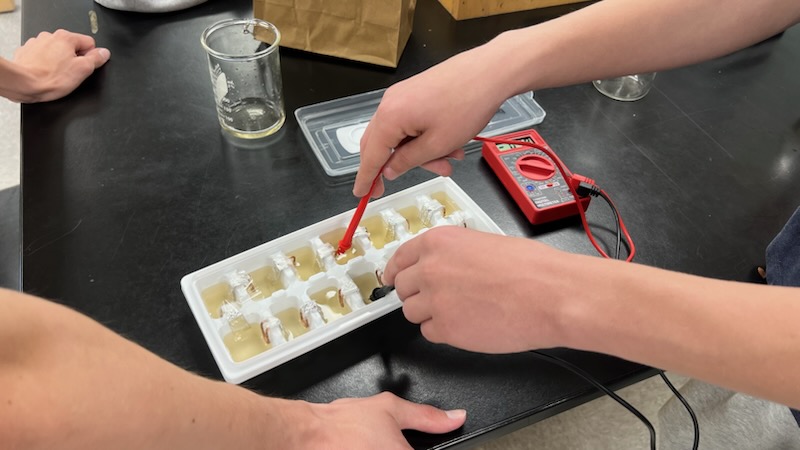Many live with disabilities, from diabetes to the inability to learn proficiently. While these may seem inconsequential, impairments of some sort affect a large number of people.
Despite physical impairments, four-year football player Walter Scott, ’08, continues to play the sport. Scott has a separated shoulder, which involves torn ligaments in the arm.
“I’ve got PVC pipe in my leg and can dislocate my shoulder,” Scott said. “If I play football anymore I might not be able to use my left arm.”
“I intend to keep playing football, though,” Scott said. “I don’t care what happens. If I screw up my arm I’ll just get surgery to fix it and continue my life.”
Despite the risky decision, Scott plans to continue in his pursuit for athletic glory.
“I don’t really view them as disabilities,” Scott said. “They’re really more like roadblocks that I have to get over, like a police training wall.”
While Scott’s ‘roadblocks’ manifest physically, some must overcome mental hurdles. Junior Andrew Bos was diagnosed with Attention Deficit Disorder (ADD) in the first grade, after noticing changes in his attention span and ability to learn.
“I was having some trouble understanding,” Bos said. “My grades were slipping and I couldn’t concentrate in class. The worst thing was I just didn’t understand the questions.”
Bos falsifies the common conception that ADD means being easily distracted or hyperactive.
“Sometimes the teacher would say something in class,” Bos said, “and 30 seconds later I had gotten distracted and forgotten what she was talking about.”
Modern medicine allows doctors more control over ADD with a drug called Concerta. However, the side effects of this can range from nothing to lackadaisical demeanor and ultimately death.
“I take one pill every morning and sometimes if I can’t get to sleep at night, I take anther one,? Bos said. ?It’s amazing how a single pill stops my ADD problems.”
While Bos found an easy way to control his symptoms, others must be more vigilant in their daily routines when controlling particular disabilities.
“I have diabetes; it’s where I cant process sugar,” senior Sean O’Neal said. “I’ve got this little monitor that tells me if my blood sugar is good or not. Basically it watches my blood and tells me if I need to eat something or hold off for a while.”
Insulin, the chemical that controls blood sugar, is usually produced in the pancreas. Diabetes, or hyperglycemia, causes the body to reject the needed insulin, which results in unhealthily high blood sugar levels.
According to the American Diabetes Association (ADA), 176,500 people in the US under the age of twenty suffer from diabetes. About one in every 400 to 600 hundred people in that same age group have type-one diabetes. While the prevalent age group is 60 plus for this disease, it is still possible in the younger generation.
“I’m just glad for the time I’ve been given,” O’Neal said, “If there’s one thing I’ve learned it’s that I wouldn?t be here if I had been born like 50 years ago. I’m just happy to be alive.”
Diabetes is manageable in a variety of ways, from switching to a vegan diet to taking pills and getting insulin injections. Today, treatment is available for diabetes, with the more serious effects of the disease avoidable through a healthy lifestyle.
“I’m scared of what might happen with my diabetes,” O’Neal said. “I’m confident someone will find a cure someday, though, so I’m not worried. I just try to live in the moment.”
O’Neal’s wait may not take much longer. In December of 2006, Toronto scientists found a way to cure diabetes in mice by injecting them with capsaicin, a chemical derived from hot chili peppers. However this has not yet been successfully tested in humans and as of yet doctors can only manage diabetes with insulin.
Technology continues to ease the load on those living with disabilities. Although cures are in the developmental stages, professionals recommend healthy diets and exercise to ameliorate symptoms and side effects.
For further information on Diabetes, students might check out Online Nursing Programs and their resource page for diabetes.







Emily Schoettler • Dec 16, 2009 at 6:47 am
Wooooo! Awesome job Jessa 🙂 She is the best middle hitter everrr. I’m so glad she decided to play for FC this year! Keep up the great work, Jess 😀
Rebekah • Dec 16, 2009 at 6:47 am
Hey, you guys are having a great volleyball season. Keep up the good work, and good luck with the rest of your season!
Roosevelt High School, Fresno
YOKO KILBOURNE • Dec 16, 2009 at 6:47 am
Have appreciated some great pictures posted on The Feather Online. Keep up the great work — and would like some pics of JV VB games and Cross Country to post on our sports BB. Tx.
Ashlyn WHITe • Dec 16, 2009 at 6:47 am
Nice pic. lol That game was a heart breaker.